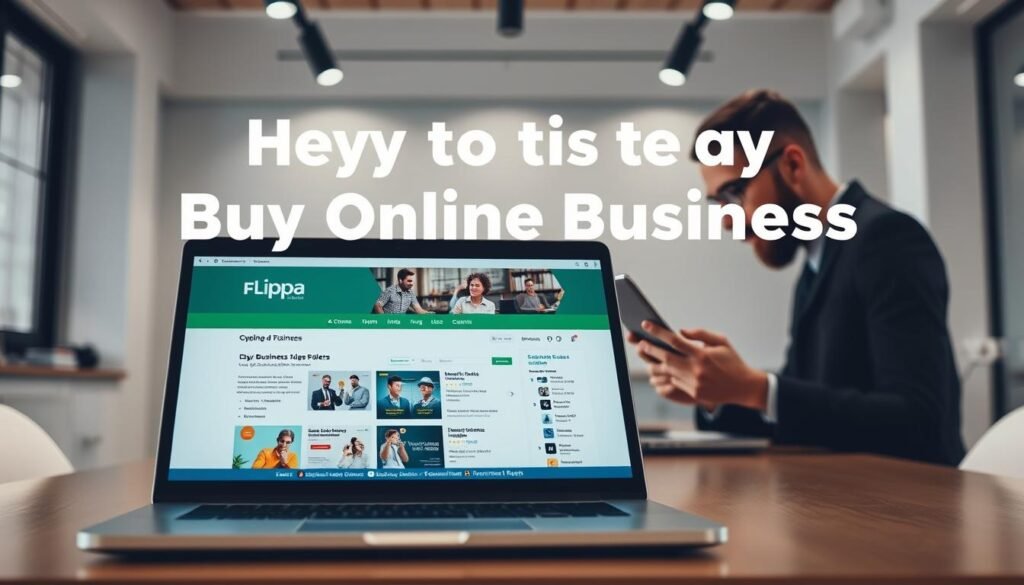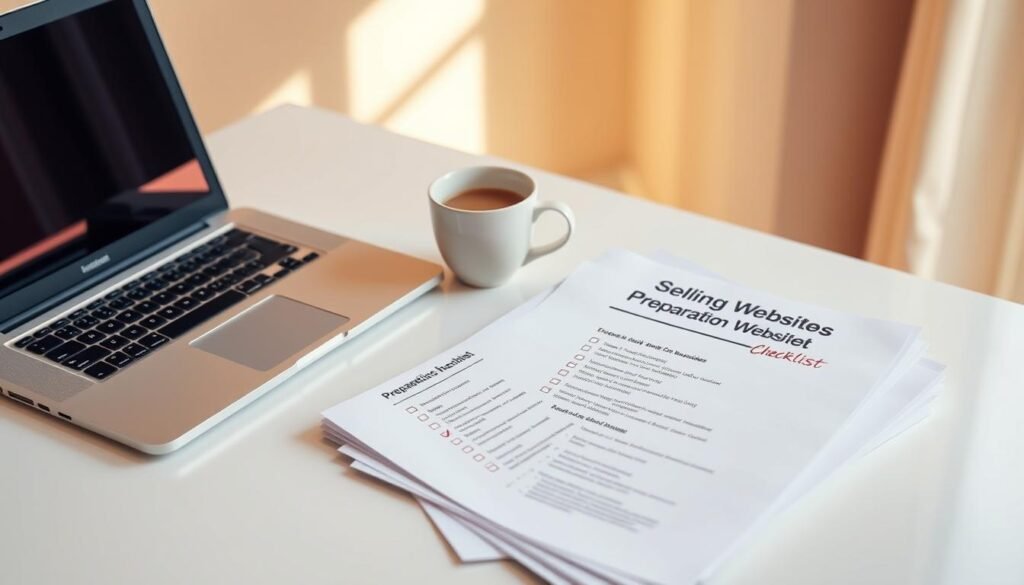Since its launch in 2009, Flippa has grown into the world’s largest digital marketplace for online businesses. Originally a spin-off from SitePoint, it now facilitates over 450,000 transactions, connecting buyers and sellers of websites, apps, and domains.
The platform specializes in peer-to-peer deals with escrow protection, ensuring secure transactions. Whether you’re trading content sites, eCommerce stores, or SaaS platforms, Flippa offers a streamlined process. However, due diligence is crucial, as listings vary in quality.
With 3 million+ users and a $15 listing fee, it’s a go-to for entrepreneurs. Success stories range from blog flips to six-figure e-commerce sales. Advanced search filters and mobile optimization make it user-friendly.
Key Takeaways
- Flippa is the largest marketplace for buying and selling digital assets.
- Supports transactions for websites, apps, and domains.
- Escrow protection ensures secure peer-to-peer deals.
- Requires careful due diligence due to mixed listing quality.
- Mobile-friendly with advanced search options.
What Is Flippa and How Does It Work?
Emerging as a digital trading hub in 2009, this marketplace revolutionized online business transactions. It enables buyers and sellers to exchange digital assets through auctions or fixed-price listings. The platform handles everything from content blogs to SaaS platforms with built-in escrow protection.
Understanding the Marketplace Model
Transactions follow three approaches: building businesses to sell, acquiring stable assets, or quick flips for profit. Sellers can list properties in 5-10 minutes, while buyers use advanced filters to find opportunities.
The peer-to-peer system requires ID verification for security. Completed sales typically take 15 days for businesses under $50k. A 10% success fee applies to finalized deals.
Types of Listings Available
Websites dominate the platform, including Amazon FBA stores and content blogs. Revenue verification tools help assess these listings, though claims require careful checking.
Mobile apps have separate requirements for iOS and Android ecosystems. Domain sales involve minimal documentation, making them the fastest transactions. Premium listings get broker assistance for better exposure.
Why Use Flippa for Buying or Selling Online Businesses?
Digital entrepreneurs have transformed their financial futures through strategic acquisitions on specialized marketplaces. The platform connects ambitious buyers with motivated sellers across 180 countries, creating opportunities at every investment level. With escrow-protected transactions and verified user profiles, it reduces risks inherent in digital asset transfers.
Buyers discover undervalued assets while sellers access qualified leads without broker fees. The platform’s 10% success fee undercuts traditional brokerage commissions by 33%, putting more money in users’ pockets. Over 4,200 active listings require strategic positioning for maximum visibility.
Mobile optimization and automated alerts streamline deal-making for busy professionals. Whether seeking starter websites under $10k or established revenue-generating assets, the marketplace accommodates diverse acquisition strategies.
Benefits for Buyers
Investors acquire pre-monetized websites with existing traffic streams, bypassing the startup phase. The 20x-36x monthly earnings multiple range creates room for profitable exits. Advanced filters help identify distressed listings with untapped potential.
Built-in valuation calculators prevent overpayment, while email alerts notify buyers about newly listed matching properties. The platform’s global reach offers niche opportunities unavailable in local markets.
Benefits for Sellers
Owners showcase their business to 3 million registered users, significantly expanding exposure beyond smaller competitor platforms. Premium listing options highlight growth potential beyond current income metrics.
Seller tools include automated valuation estimates and performance analytics to justify asking prices. The streamlined transfer process handles technical migrations, allowing sellers to focus on negotiation rather than logistics.
The Pros and Cons of Using Flippa
The right platform balances opportunity with due diligence. While Flippa dominates the digital marketplace space, users report mixed experiences. Success hinges on understanding its trade-offs.
Advantages of Flippa’s Platform
Sellers tap into a global pool of 3 million buyers, increasing deal potential. The platform supports auctions, fixed-price listings, and broker-assisted sales for high-value assets. Built-in traffic analytics help justify valuations.
Unlike competitors, listing fees start at $15 with no upfront commissions. Historical sales data provides benchmarks for pricing. Escrow protection adds security to the transfer process.
Common Challenges and Risks
Nearly half of user reviews cite scams, like falsified Google Analytics reports. The 15-day average sale time lags behind vetting-focused alternatives. Buyers must manually verify claims about traffic and revenue.
App and SaaS transfers often face technical hurdles with codebases. The 10% success fee for sub-$50k deals may deter small sellers. Always cross-check quality metrics before committing.
How to Buy a Business on Flippa: A Step-by-Step Guide
Acquiring an online business demands careful planning and thorough research. The platform streamlines the process, but savvy buyers combine data analysis with negotiation tactics to secure assets with growth potential. Focus on aged listings (2+ years) and verified revenue streams ($50–$2,000/month) for stability.
Setting Up Your Buyer Profile
A complete profile boosts credibility. Verify your ID and link professional social media accounts to build a trust rating. Sellers prioritize serious buyers, so include details like your investment goals and niche preferences.

Searching and Filtering Listings
Use advanced filters to narrow listings by price-to-earnings ratios, niche, and traffic sources. Saved search alerts notify you of new matches. Target sites with undeveloped monetization—like blogs lacking affiliate links—for higher ROI potential.
Evaluating Listings: Key Metrics to Check
Scrutinize 12-month earnings reports via Stripe or PayPal. Cross-check traffic data with Semrush or Ahrefs to confirm sources. Avoid sites with spam scores above 30% or thin content. Case studies show assets like an $8k blog sold for $27k after optimizing ad placements.
Always negotiate: Start bids 20–30% below asking prices. Request admin access during the 7-day escrow period to verify claims before finalizing the purchase.
Essential Due Diligence When Buying on Flippa
Smart investors know thorough research separates great deals from costly mistakes. Nearly 33% of listings inflate revenue by 40% or more, making verification non-negotiable. Make sure to cross-check every claim before committing funds.
Verifying Traffic and Revenue Claims
Authentic traffic data requires more than screenshots. Compare Google Analytics with server logs and payment processor reports. For income verification, request monthly P&L statements or tax filings.
Tools like SEMrush reveal historical trends and geographic traffic sources. Avoid websites with sudden traffic spikes—often signs of bot activity. Premium reports ($1,500–$2,500) can audit high-value listings.
Spotting Red Flags and Scams
Newly registered domains or inconsistent analytics often indicate scams. Check for copied content using plagiarism tools and review backlink profiles for spam. Make sure ownership documents match seller IDs.
Private listings bypass platform oversight—insist on video calls with screen-sharing. Legal checks should include trademark searches and DMCA risk assessments. For code-heavy assets like apps, review documentation before transfer.
How to Sell Your Online Business on Flippa
Selling an online business requires strategy, presentation, and accurate valuation. Whether you’re offloading a blog, e-commerce site, or SaaS platform, the right approach can mean the difference between a quick sale and a stalled listing. Focus on three pillars: preparation, listing quality, and competitive pricing.
Preparing Your Business for Sale
Clean financial records are non-negotiable. Buyers scrutinize 12 months of revenue proof, so organize PayPal or Stripe reports. Remove personal branding and fix technical issues like broken links or slow hosting.
Document standard operating procedures (SOPs) and supplier contacts. A $1,200/month blog once sold for $28k partly because the seller included a training manual. Offer 30-day post-sale support to build trust.

Creating an Attractive Listing
83% of sold listings include video walkthroughs. Show traffic analytics, revenue streams, and growth potential visually. Use professional photos and highlight assets like email lists or social media followers.
Premium listings cost $299 but boost visibility by 70%. Share your listing in niche forums and LinkedIn groups to attract serious buyers. Emphasize untapped money-making opportunities, like unused ad space.
Setting the Right Price
Use the platform’s valuation tool and compare similar selling websites. Most sites sell for 20–36x monthly profits. Avoid overestimating “potential” value—buyers want proof, not promises.
Set a reserve price to filter lowball offers. Negotiation tactics matter: case studies show sellers who highlight scalable levers (e.g., SEO gaps) close deals 22% faster.
Flippa’s Fee Structure: What You Need to Know
Understanding the cost structure is crucial before engaging in any marketplace transaction. The platform uses a tiered fee system that impacts your final profit or sale price. Smart budgeting separates successful deals from financial surprises.
Listing Fees and Success Fees
Basic listings start at $15 for domains and $49 for established businesses. The real cost comes from the success fee – 10% for sales under $50k, decreasing to 3% for million-dollar deals.
A $25,000 website sale would incur $2,500 in platform fees. Escrow services add another 1% (minimum $200). Always factor these costs when setting your maximum bid or reserve price.
Additional Costs for Premium Features
Featured listings ($299) get homepage placement and social media promotion. Full broker assistance costs 15% but includes valuation reports and buyer vetting. These upgrades can significantly improve visibility.
Hidden expenses include NDAs ($50) and third-party verification reports ($1,500+). Some sellers report spending 15-20% of their final money on combined fees. Tax forms (1099-K) trigger at $600 in earnings.
Compare these costs to alternatives like MotionInvest’s no-fee model. The right choice depends on your asset value and desired support level. Always read the fine print before listing.
Strategies for Success on Flippa
Strategic approaches separate top performers from average users on business trading platforms. Whether acquiring or selling digital assets, tailored tactics dramatically impact outcomes. Data shows 68% of winning buyers use saved search alerts, while video-enhanced listings sell 50% faster.
Tips for Buyers to Secure the Best Deals
Smart investors target expired listings with seller financing—like one buyer who acquired an $800/month SaaS for $14k through flexible terms. The process favors those who:
- Bid during off-season periods (November-January)
- Use “Make Offer” for immediate negotiations
- Avoid auctions exceeding 30x monthly profits

Tips for Sellers to Maximize Profits
Sellers who position assets as turnkey operations see quicker sales. A case study revealed listings with transition support closed 22% faster. Key methods include:
- Adding coaching services to create monthly recurring revenue
- Running 7-day discount promotions
- Providing video walkthroughs (boosts conversions by 50%)
Never bypass escrow, even if buyers pressure for direct transfers. Fixed-price “Buy It Now” offers typically close three times faster than auctions.
Common Flippa Scams and How to Avoid Them
Navigating online business marketplaces requires awareness of potential scams. Reports show 22% of buyers encounter misleading claims, from inflated revenue to fake traffic sources. Protecting your investment starts with knowing the red flags.
Fake Revenue and Traffic Reports
Altered Stripe dashboards and fabricated AdSense screenshots are common tricks. Scammers often pump up traffic numbers or hide income drops. Verify claims using:
- Reverse image searches to check screenshot authenticity
- Wayback Machine for historical website data
- Live screen shares with API access to analytics
Protecting Yourself During Transactions
Escrow chargebacks occur in 8% of deals. Avoid private email offers—stick to platform messaging. Key safeguards include:
- 7-day inspection periods before releasing funds
- Contracts with non-compete clauses and asset lists
- Flippa’s dispute resolution for verified badge listings
One buyer lost $5k to fake Amazon FBA screenshots. Always cross-check income proofs with third-party tools. For high-value deals, insist on video calls and legal paperwork. Prevention beats recovery when tackling scams flippa users face.
Flippa Alternatives for Buying and Selling Businesses
The digital business marketplace landscape offers specialized alternatives for different transaction needs. While one platform dominates, several competitors cater to specific niches and budget ranges. Savvy investors evaluate multiple options before committing.
Comparing Marketplace Options
MotionInvest specializes in content sites earning $50-$2,000 monthly. Their pre-vetted listings and zero-fee model attract quick-turnaround buyers. Unlike auction platforms, they focus on fixed-price sales with instant transfers.

For established businesses, Empire Flippers requires $25k+ listings with 8% commissions. Their team verifies financials and handles high-value eCommerce transfers. FE International targets SaaS and affiliate websites above $500k with white-glove brokerage.
When to Switch Platforms
Consider alternatives when dealing with complex tech stacks or regulated niche markets. Some platforms mandate 90-day exclusive contracts, limiting flexibility. Emerging players like Microns focus on micro-SaaS acquisitions under $10k.
A hybrid approach works best for many sellers. Listing simultaneously on multiple marketplaces increases exposure. One developer sold an app after failing on BizBroker24 by cross-posting to general and specialized platforms.
Real-World Success Stories from Flippa
Success in online business trading isn’t theoretical—real deals prove what’s possible. These case studies show how buyers and sellers turned opportunities into profit. From blogs to e-commerce, strategic moves make the difference.
Case Study: Buying a Profitable Blog
One investor bought a $12k blog with stale content but strong SEO foundations. Over 18 months, they refreshed posts, added affiliate links, and scaled earnings to $4k/month. The result? An $86k sale—a 7x return.
Key tactics included:
- Repurposing underperforming content with new keywords
- Negotiating higher commissions with partners
- Using analytics to double down on top-traffic pages
Case Study: Selling an E-commerce Store
A dropshipping store listed for $142k after the owner renegotiated supplier rates and optimized Facebook Ads. The buyer saw potential in the 450% ROI from prior tweaks. Profits jumped from $2k to $9k/month in two years.
Growth levers that mattered:
- Switching to local warehouses for faster shipping
- A/B testing ad creatives weekly
- Bundling products to increase average order value
Lessons learned: Due diligence pays—60% of flips underperform. Prepared buyers average 3.4x ROI. Hold periods of 6-24 months balance quick wins with sustainable growth.
Conclusion
The digital business marketplace opens doors for entrepreneurs at every level. Whether buying or selling, success hinges on due diligence, smart fee planning, and exploring alternatives. Flippa remains a key player in making digital asset trading accessible.
Avoid impulse purchases—verify traffic, revenue, and ownership details. The industry grows at 12% annually, offering more opportunities. Beginners should start with small websites under $5k to learn the ropes.
For simpler transactions, platforms like MotionInvest provide curated listings. Future tools like AI valuations will streamline deals further. Join seller webinars to sharpen your skills.
Remember: 1 in 3 buyers become sellers within two years. Approach each deal strategically, and the marketplace can be a powerful wealth-building tool.
FAQ
What types of businesses can I buy or sell on Flippa?
You can trade websites, apps, domains, and even established e-commerce stores. The marketplace caters to various niches, from blogs to SaaS businesses.
How do I verify a seller’s claims about revenue and traffic?
Request access to Google Analytics, bank statements, or ad revenue reports. Third-party tools like SEMrush or Ahrefs can also help validate traffic data.
What fees should I expect when selling my business?
Sellers pay a success fee (a percentage of the sale price) and may opt for premium listing upgrades. Buyers typically pay no fees beyond the purchase price.
Are there scams on Flippa, and how can I avoid them?
Yes, scams exist, such as inflated traffic stats. Protect yourself by demanding proof of earnings, using escrow services, and checking seller reviews.
What’s the best way to price my business for sale?
Base your price on revenue multiples (e.g., 20–40x monthly profit), industry standards, and asset quality. Tools like Empire Flippers’ valuation calculator can help.
Can I negotiate the price with sellers?
Absolutely. Many listings welcome offers. Use verified data to justify your bid and aim for a win-win deal.
How long does it take to sell a business on Flippa?
It varies. Well-documented listings with strong metrics may sell in weeks, while niche or overpriced assets could take months.
What are the top alternatives to Flippa?
Consider Empire Flippers, FE International, or Quiet Light Brokerage for higher-value businesses. Microacquire is ideal for SaaS startups.
Do I need a broker to buy or sell on Flippa?
No, but brokers can streamline high-value deals. For smaller transactions, direct negotiation is common.
How do I transfer ownership after a purchase?
Use escrow services like Escrow.com for secure payments. Sellers should provide domain transfers, hosting access, and operational documentation.






